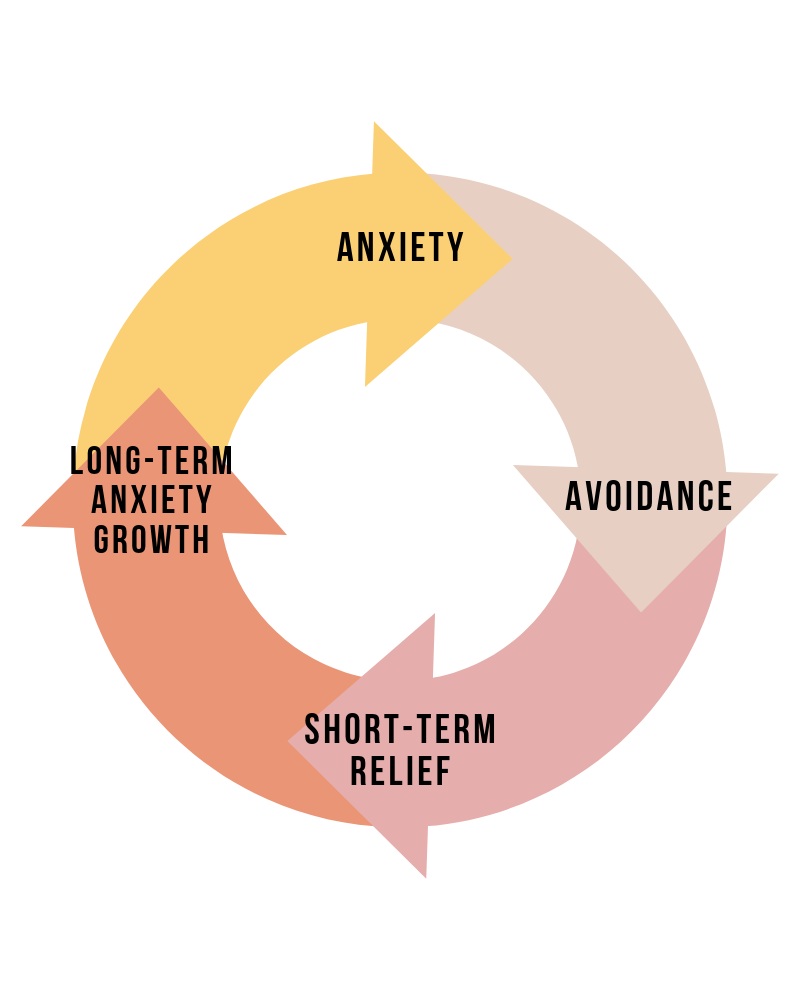Exploring Various Approaches in Counselling for Anxiousness Disorder for Enduring Change
When dealing with anxiousness conditions, it's vital to explore a selection of therapy approaches. Each method provides distinct insights and tools to help you manage your signs and symptoms effectively. You could locate that combining methods can produce the very best outcomes. Recognizing the subtleties of these strategies is essential to cultivating enduring modification. What happens if the best mix could release a new level of emotional well-being for you?
Comprehending Stress And Anxiety Conditions: A Brief Summary
Anxiousness conditions, which influence numerous individuals worldwide, can greatly influence everyday life. You may experience overwhelming feelings of worry or fret that seem uncontrollable. These feelings can bring about physical symptoms like an auto racing heart, sweating, or also wooziness. Typical types of anxiety conditions consist of generalised stress and anxiety condition, panic problem, and social anxiousness condition. Each has unique signs, but they all share a propensity to interrupt your regular and relationships.Understanding the source of your anxiousness is crucial. It could stem from genetics, brain chemistry, or life experiences. Recognizing your triggers can aid you manage your actions better. It is necessary to remember that you're not alone in this battle. Several individuals face similar obstacles, and seeking assistance is a solid action towards sensation much better. By discovering about anxiety problems, you're currently on the path to understanding and handling your problem better.
Cognitive-Behavioral Treatment: Challenging Unfavorable Idea Patterns
In Cognitive-Behavioral Therapy, you'll start by determining the unfavorable thought activates that add to your stress and anxiety. You'll work on changing them with even more positive options once you recognize these ideas. Together, you'll build effective coping methods to assist manage your anxiety in daily scenarios.
Determining Adverse Thought Triggers

When you run into moments of distress, identifying the particular triggers behind your adverse thoughts can be vital in taking care of anxiousness. Beginning by focusing on circumstances that prompt sensations of worry or worry. Is it a jampacked area, a forthcoming deadline, or a conversation with certain people? Jot down these instances in a journal. This will help you identify patterns in your thinking. Notification physical experiences that accompany your unfavorable thoughts, like a racing heart or rigidity in your breast. By pinpointing these triggers, you obtain insight into what's fueling your anxiousness. Understanding these connections is the initial step in challenging those thoughts and ultimately regaining control over your psychological actions.
Replacing Thoughts With Positives
Testing unfavorable thought patterns is a necessary action in changing your attitude and minimizing stress and anxiety. You may typically discover yourself trapped in cycles of insecurity or tragic reasoning. Rather than allowing these ideas determine your feelings, practice replacing them with positive affirmations or realistic alternatives. When you believe, "I can not handle this," change it to, "I can handle difficulties one action at a time." This easy modification can greatly influence your emotional state. Routinely recognizing and countering these negative thoughts assists create a much healthier internal dialogue. Keep in mind, it takes some time and initiative, however continually practicing this method can bring about enduring change, equipping you to face anxiousness with renewed confidence and resilience.
Structure Coping Methods Together
Replacing negative ideas is just the start of managing stress and anxiety effectively. To develop long lasting adjustment, you need to develop coping techniques that encourage you. Cognitive-Behavioral Therapy (CBT) assists you recognize and challenge those purposeless idea patterns. Together, you and your therapist can explore exactly how these ideas effect your sensations and behaviors.Start by developing functional strategies, like journaling or mindfulness exercises, that enable you to challenge stress and anxiety head-on. When you encounter your fears slowly, you'll find out to react in different ways.

Mindfulness and Acceptance-Based Approaches: Growing Present-Moment Awareness
As you browse the complexities of stress and anxiety, including mindfulness and acceptance-based approaches can significantly boost your ability to grow present-moment recognition. By focusing on the right here and currently, you'll locate that you can observe your thoughts and feelings without judgment (Counseling services for anxiety). This method helps you acknowledge your anxiety without feeling bewildered by it.Engaging in mindfulness workouts, such as deep breathing, body scans, or guided meditations, enables you to ground on your own in your existing experience. Acceptance-based strategies encourage you to accept your feelings instead of battle against them. When you accept your feelings, they shed their power over you.Incorporating these techniques right into your daily routine can transform exactly how you react to anxiousness. You'll establish durability and discover to browse difficult circumstances with higher ease. Eventually, growing present-moment recognition lays the structure for lasting change, equipping you to lead an extra meeting life
Direct Exposure Therapy: Confronting Concerns Slowly
Direct exposure treatment assists you confront your fears in a gradual means, making it much less frustrating. You'll discover methods to deal with anxiety-provoking circumstances step by step, while also building coping strategies to manage your responses. This strategy encourages you to take control and minimize stress and anxiety in time.
Gradual Exposure Strategies

When facing anxiety, progressively challenging your concerns can be a powerful way to regain control. This technique, called steady direct exposure, includes slowly revealing on your own to the scenarios or items that cause your stress and anxiety. Beginning with much less daunting circumstances and gradually work your way as much as even more challenging ones. For example, if you're terrified of public speaking, you might start by talking before a mirror, then proceed to sharing ideas with a pal, and eventually address a small group. Each step aids desensitize you to the concern, developing your self-confidence in time. Remember, it's vital to pace on your own and commemorate tiny triumphes as you relocate through this process, strengthening your capacity to manage anxiety properly.
Structure Coping Approaches
Building effective coping approaches is important for taking care of anxiety, specifically as you confront your concerns progressively - Counseling services for anxiety. One powerful technique is direct exposure therapy, where you begin by encountering your worries in a regulated way. Start with much less intimidating circumstances and gradually work your method approximately even more challenging situations. This steady exposure assists desensitize you to anxiousness triggers, making them less overwhelming.Incorporate relaxation strategies, such as deep breathing or mindfulness, to relax your mind during exposure. Track your development, commemorating tiny victories along the road to enhance your self-confidence. Remember, it's alright to take your time; the goal isn't excellence yet steady improvement. By developing these methods, you'll encourage on your own to browse anxiety and embrace life much more completely
Psychodynamic Therapy: Discovering Origin of Anxiousness
Psychodynamic treatment counselling for anxiety disorder discovers the subconscious mind, disclosing the root causes of your anxiety. By examining your thoughts, feelings, and past experiences, this approach helps you uncover underlying conflicts and unsettled problems that might add to your present anxiety. You'll collaborate with a therapist to examine youth experiences, connections, and emotional patterns that shape your feedbacks today.As you obtain insight into these deeper layers of your subconscious, you'll begin to identify just how previous events influence your existing actions. This understanding can bring about catharsis, permitting you to refine emotions you might have suppressed.Through the therapeutic partnership, you can additionally determine defense reaction that may have created with time, providing a clearer path to change. Inevitably, psychodynamic treatment furnishes you with the tools to resolve your stress and anxiety at its core, promoting lasting transformation in your psychological wellness.
Holistic and integrative Strategies: Incorporating Methods for Greater Efficacy
Incorporating different therapeutic strategies can improve your journey towards handling anxiety extra successfully. By combining components from cognitive-behavioral therapy, mindfulness practices, and all natural methods, you can develop a tailored technique that addresses your special needs. You could use cognitive-behavioral strategies to challenge unfavorable idea patterns while integrating mindfulness workouts to ground yourself in the present moment.Additionally, discovering holistic methods such as yoga exercise or meditation can advertise leisure and reduce anxiety signs. This mix allows you to establish higher self-awareness and resilience.Experimenting with these diverse methods can help you find what reverberates most with you. Keep in mind, it has to do with finding a synergy that functions, instead of staying with a single approach. This integrative strategy not just offers instant alleviation but likewise promotes lasting skills for managing stress and anxiety, encouraging you to reclaim control over your life.
The Role of Support Solutions: Structure Strength Through Connection
While it might seem that handling anxiousness is a singular trip, having a strong support group can play a vital function in your strength. Bordering on your own with understanding buddies, household, or support system produces a risk-free area where you can freely share your experiences and sensations. When you get in touch with others, you advise on your own that you're not the only one in this struggle.These partnerships supply encouragement and can provide useful coping approaches that have actually functioned for others. It's additionally a chance to get perspective; pals can assist you see situations differently, reducing sensations of isolation.Moreover, psychological assistance fosters a feeling of belonging, which can considerably ease stress and anxiety signs. By leaning on your support group, you can construct strength and deal with challenges better. Bear in mind, connecting for help suggests stamina, and it can make all the difference in your trip towards managing anxiety.
Regularly Asked Concerns
What Are the Usual Signs of Anxiety Problems?
You could experience uneasyness, fatigue, trouble concentrating, impatience, muscular tissue tension, and sleep disruptions. Physical signs and symptoms can consist of quick heart beat, sweating, and trembling. Identifying these indicators early can help you seek appropriate support and treatment.
How Much Time Does Treatment Normally Last for Stress And Anxiety Conditions?
Therapy for anxiety conditions generally lasts anywhere from a couple of weeks to a number of months. It actually depends upon your private needs, development, and the techniques your specialist makes use of to assist you handle your anxiousness successfully.
Can Medicine Be Utilized Together With Treatment for Anxiety?
Yes, medication can certainly be utilized alongside therapy for stress and anxiety. Combining both strategies commonly improves treatment performance, assisting you take care of signs while discovering underlying problems through counseling (Counseling services for anxiety). Always consult your health care company for tailored guidance
Exist Self-Help Techniques for Taking Care Of Anxiety?
Yes, there are numerous self-help methods for managing stress and anxiety. You can exercise mindfulness, involve in regular workout, preserve a balanced diet plan, establish a regular, and make use of deep breathing strategies to help minimize anxiousness signs effectively.
Just how Do I Know if I Need Professional Assistance for Stress And Anxiety?
